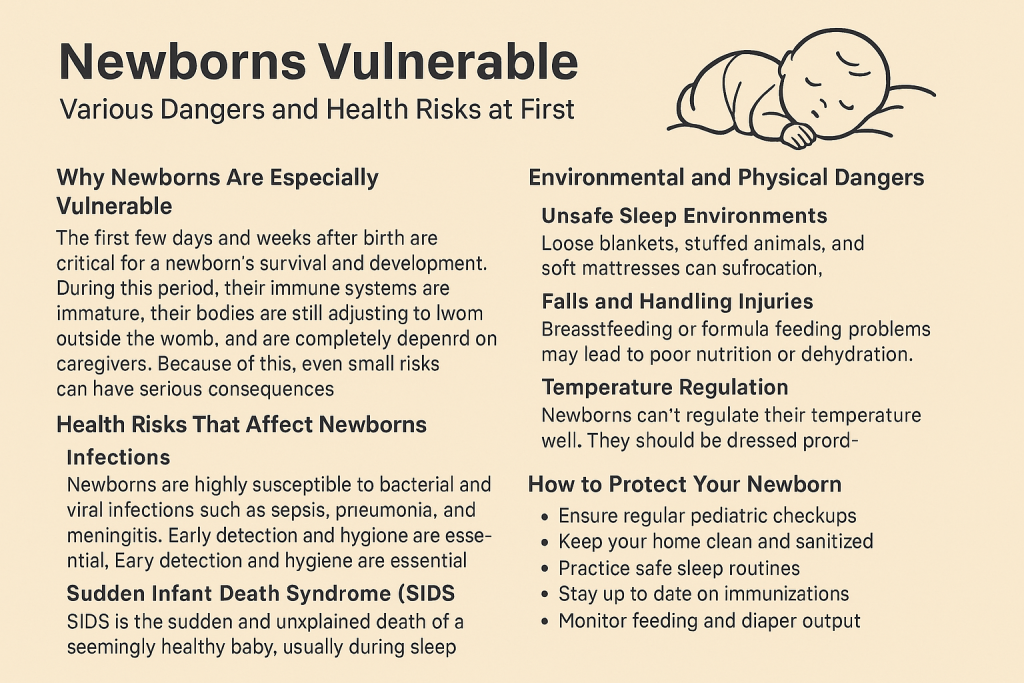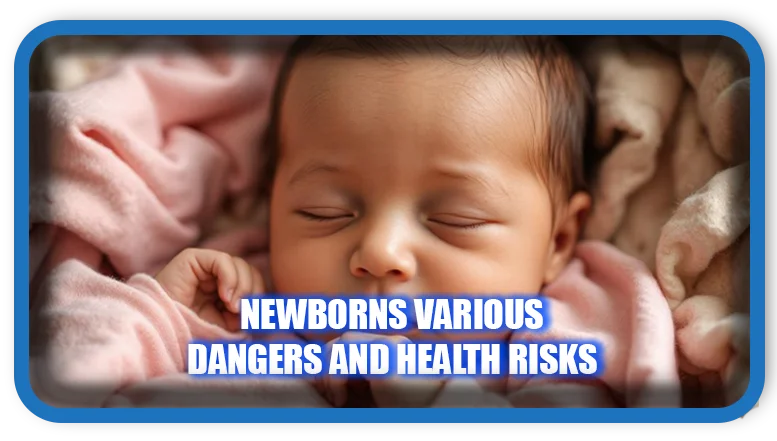⏲️ Estimated reading time: 3 min
Newborns Vulnerable | Various Dangers and Health Risks at First
Newborns face many dangers and health risks in their first days. From infections to SIDS, understanding these challenges is key to keeping babies safe and healthy during early development.
Why Newborns Are Especially Vulnerable
The first few days and weeks after birth are critical for a newborn’s survival and development. During this period, their immune systems are immature, their bodies are still adjusting to life outside the womb, and they are completely dependent on caregivers. Because of this, even small risks can have serious consequences.
Health Risks That Affect Newborns
1. Infections
Newborns are highly susceptible to bacterial and viral infections such as sepsis, pneumonia, and meningitis. Their immune systems have not yet developed strong defenses. Infections can enter through the umbilical cord, birth canal, or from the environment. Early detection and hygiene are essential.
2. Respiratory Distress
Especially common in premature babies, respiratory distress syndrome (RDS) can make breathing difficult due to underdeveloped lungs. Immediate medical attention is needed, and some babies may require oxygen or ventilation support.
3. Jaundice
Mild jaundice is common in newborns due to the liver’s immature ability to process bilirubin. However, high levels of bilirubin can lead to brain damage if untreated. Phototherapy and regular monitoring help prevent complications.
4. Sudden Infant Death Syndrome (SIDS)
SIDS is the sudden and unexplained death of a seemingly healthy baby, usually during sleep. Although the exact cause is unknown, safe sleeping practices like placing the baby on their back, avoiding soft bedding, and not overheating the baby can reduce the risk.
Environmental and Physical Dangers
1. Unsafe Sleep Environments
Loose blankets, stuffed animals, and soft mattresses can pose suffocation risks. Always place newborns on a firm mattress with no extra items in the crib.
2. Falls and Handling Injuries
Newborns can fall or be injured by improper handling. Always support the baby’s head and never leave them alone on a high surface.
3. Feeding Challenges
Breastfeeding or formula feeding problems may lead to poor nutrition or dehydration. Parents should monitor weight gain and ensure the baby is latching well and feeding regularly.
4. Temperature Regulation
Newborns can’t regulate their temperature well. They should be dressed appropriately for the room temperature not too hot or too cold.

How to Protect Your Newborn
- Ensure regular pediatric checkups
- Keep your home clean and sanitized
- Practice safe sleep routines
- Stay up to date on immunizations
- Monitor feeding and diaper output
Understanding these early-life risks allows parents to take proactive steps. With care, attention, and support, most newborns grow into healthy children despite these initial vulnerabilities.
🏷️ Tags: newborn care, infant health risks, baby safety, newborn infections, SIDS awareness, newborn jaundice, safe sleep tips, baby feeding issues, parenting advice, newborn development
Only logged-in users can submit reports.
Discover more from HelpZone
Subscribe to get the latest posts sent to your email.


